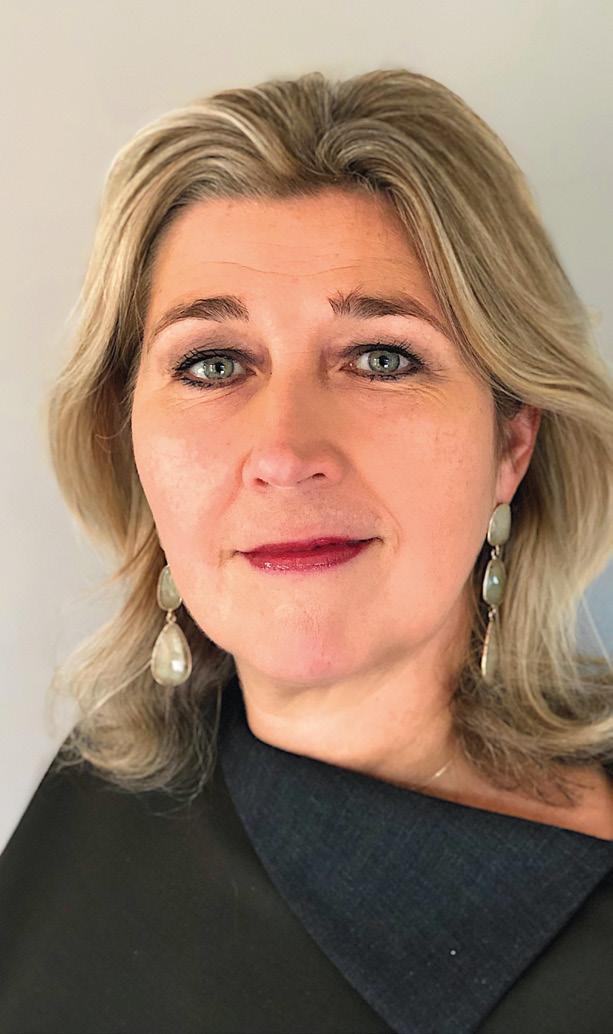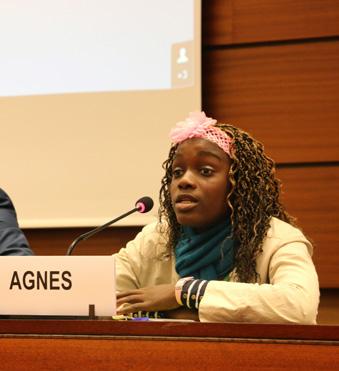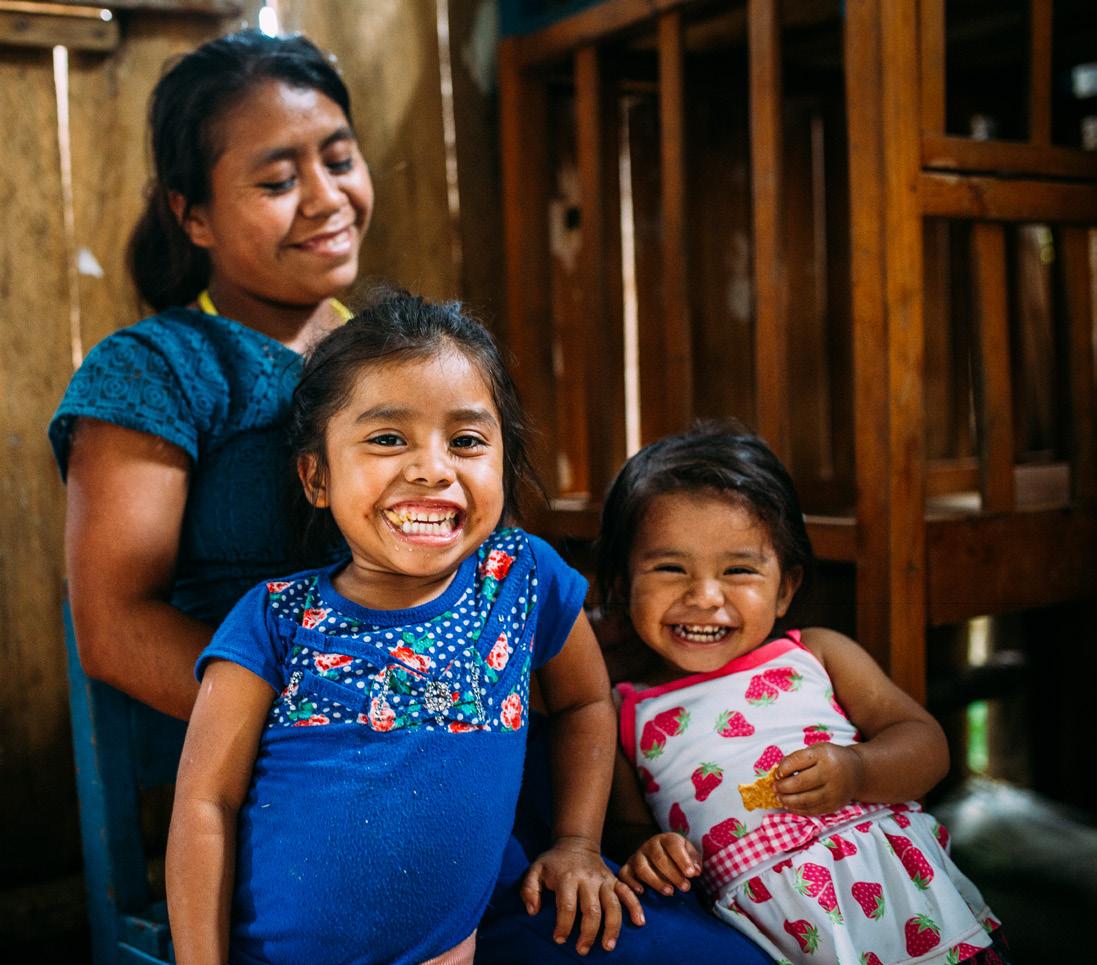
9 minute read
1 Preventing child-family separation
The child is at the centre of everything we do at SOS Children’s Villages. We actively involve children and young people in the decisions and processes that affect their lives. We ask for their opinion and listen to what they have to say. In a year dominated by Covid-19, our efforts to defend the rights of each child continued unabated.
Advertisement
Arian Buurman Managing director of SOS Children’s Villages The Netherlands
The strength of family is always key in this endeavour. In our work to strengthen families and care for children in an SOS or foster family, to make education accessible and improve the employability of young people, as well as during crisis situations. Wherever you are born in the world, a strong family is the key to a bright future.
Right to participation
We respect the right of children to be involved in discussions and issues. This might seem obvious, but sadly we still find that decisions are often made on behalf of children and young people instead of with them. The right to participation, established in the UN Convention on the Rights of the Child, serves as a guiding principle in all our activities. At SOS Children’s Villages children and young people are always involved in decisions that affect their lives, in shaping their future. We give them a voice.
Focus on strengthening families
The right to participation goes hand in hand with the right to unconditional parental care, protection and education. Led by the UN Guidelines for the Alternative Care of Children, SOS Children’s Villages has embarked on the transition to focus on prevention; to strengthening families. This is to prevent children being neglected and abandoned and to make sure families stay together. As in the case of Joyce, who I was able to visit twice in 2019, and who was so proud she was able to earn enough again to look after her children properly. Her little girls were back at school and could continue to pursue their dreams. When I asked a local colleague about how she was doing now, a year later, I heard that although life remains tough she is doing well. The pandemic has made things more complex, but Joyce has received a grant for her charcoal and kerosene business, has been supported with the renewal of their health insurance and, most importantly, she can provide for her children.
Evolving family-based care
In the wake of the transition to prevention we continuously evaluate the family-based care we provide. Care that remains necessary if children no longer have anyone to care for them, or if (temporarily) they can no longer grow up safely in their own family. Children who need temporary care, while the family is strengthened to become more resilient, so that the children can eventually reintegrate safely into their family of origin.
At the same time, we are working on expanding and relocating our SOS family homes into the community. As a result children become part of the local community and find it easier to make friends outside the Children’s Village; it prepares them more effectively for their future life in a similar environment.
These developments mean that we can support more children and young people and guide them towards a future in which they are more self-reliant; it means we can increase our impact. Thanks to our supporters we can break the circle of poverty and vulnerability. Something that extends to future generations. After all, a child passes on the things he or she learns.
Fourteen-year-old Agnès is passionately committed to bringing an end to the violation of children’s rights in her homeland and is knowledgeable and self-confident in her work as an activist for children’s rights; she is bold enough to speak out. Not only in her own environment, but also at the European Commission in Brussels.
Watch the video of Agnès speaking at the European Commission at soskinderdorpen.nl/verhalen/agnesverdedigt-de-rechten-van-kinderen/

Customised support
Placing the child at the centre of our work means providing customisation. The family strengthening and family-based care we provide is tailored to the personal situation and environment of each child and each family. So people receive the support they really need. Support provided by a team of local people, since our organisation is entirely based on a local approach. Our SOS colleagues in the field are familiar with the situation, culture, children and the families, and are thus able to build up a relationship of trust because they are around long-term. This constitutes an important aspect for the sustainable impact of the work we do.
In order to be able to deliver customised work and sustainable impact, cooperation is crucial. By involving the children and families – examining their options and how we can improve them. And by working together and sharing knowledge with local, national and international organisations, so we can work more efficiently and more effectively. We can strengthen one another, and focus on the most important result: to help more children and their families. The results demonstrate that joining forces works and call for greater and closer cooperation.
Contribute to Dutch youth care - Simba Family Care
The importance of working together also applies to our pilot programme in the Netherlands: Simba Family Care, funded by our long-term partner Dutch Postcode Lottery. A programme in which we explicitly involve the parents and work together with experienced organisations in Dutch youth care. We believe the best way to increase the chance of successful family reintegration is by making the family stronger through personal, intense support and keeping siblings together. We have started supporting the first four families and in 2020 the children from one family have been reunited with their parents. A truly heartwarming event and the first confirmation that this form of family care is making a difference and has a future. On page 26 you can read a personal story of the family counsellor addressed to the mother of this family. My dream for the future? To contribute to structural change in Dutch youth care in association with relevant parties in the field, so that more children can continue to grow up safely in their own family. No individual has a monopoly on wisdom. It is important that we learn together and that we use the knowledge acquired to help as many families as possible.
Expertise
In recent years, in the Netherlands we have evolved to become an expert humanitarian and development organisation. And in 2021, we are going to increase our efforts to inform stakeholders in our sector and the Dutch public of our expertise and our activities focused on our target group. Of the importance of a strong family, having siblings grow up together and the vital focus on family reintegration when children are taken into alternative care. On respecting and complying with the rights of the child, protecting and caring for children in crisis situations, such as on the Greek islands. And on the efforts needed to support young people from family-based care or vulnerable families, so they have a real chance of successfully taking the step towards self-reliance.
Support with a personal contribution
During the virtual Youth at Heart conference, organised by Minister Kaag of Foreign Trade and Development Cooperation on 2 November 2020, we were one of the few development organisations invited to talk about our youth employment programme: YouthCan! A unique programme based on personal involvement in the form of mentorships involving local employees of our regional, national and international partners. An initiative for which we are constantly looking for new partners who are willing to make a contribution to youth development through a different, special approach. There was also an interview with Deborah, who followed our youth employment programme The Next Economy. With great success, because she now runs her own environmentally-friendly fashion brand. You can read her inspirational story on page 28 of this annual report. The year of Covid-19
Of course, 2020 was the year in which Covid-19 played a key role, and at the time this report is being written, we are still subject to a number of restrictions. It represents a huge challenge. For children, young people and families in our programmes, for our colleagues in the field, for my colleagues here in the office. For you, the donor. For us all. In the Netherlands, we have to deal with the fact we cannot be together, nevertheless we remain close due to our common goal. It is interesting to see that digitisation means we can ‘just’ carry on working, but the real value of being able to see one another in person hit home this year. It is just easier to get a sense of the context face to face. During my ‘walk and talk’ sessions with colleagues who have joined us during Covid-19, it became clear that they, too, feel a strong connection to our organisation. Despite the fact they only know the majority of their colleagues from their computer screen. This feeling of unity is something that really makes me happy.
Our colleagues in the countries and territories in which we operate also demonstrated their resilience. In spite of all the limitations and dangers, they worked tirelessly to support families in difficult circumstances, supplying food parcels, distributing hygiene kits and face masks, making it possible for children to receive home education – handing out homework sheets or solar-powered radios so the national school broadcasts can be followed, and now in Ghana by setting up eight temporary centres for home schooling, where 900 children from five communities can receive education in safety. The majority of our youth employment programmes could be continued online. And in Ethiopia we led a Covid Joint Response by the Dutch Relief Alliance in which mental health and rebuilding livelihoods are important components. Naturally, it was not always possible for us to provide the assistance we had envisaged, there were instances in which things did not work out or progress was slower than planned. But the organisation persevered and demonstrated resilience. Looking back, I can conclude that we triumphed through the ups and downs. And that is something I am immensely proud of.
Unconditional support of our partners and donors
On 24 November 2020, SOS Children’s Villages The Netherlands, celebrated its 55th anniversary. Still the urgency of our work persists: one in ten children worldwide has to fend for themselves, or grows up without the care, protection and the guidance they need. For many of them Covid-19 has not improved their situation. We have a moral duty to help these vulnerable children. To fight for them. Together. Side by side. With you. Now, more than ever, we would like to thank our partners, donors and supporters for making our work possible, for their commitment. Despite all the challenges of 2020, you remained loyal to the children, young people and families. With this support and by increasing our cooperation this coming year, we can continue to achieve our objectives: to help more children, exert a greater impact and tackle any new challenges that arise. So we can ensure the rights of the child become a reality for all children.
Arian Buurman Managing Director of SOS Children’s Villages The Netherlands
If you have any questions or would like to contribute to making the rights of the child the reality for all: arian@soskinderdorpen.nl











